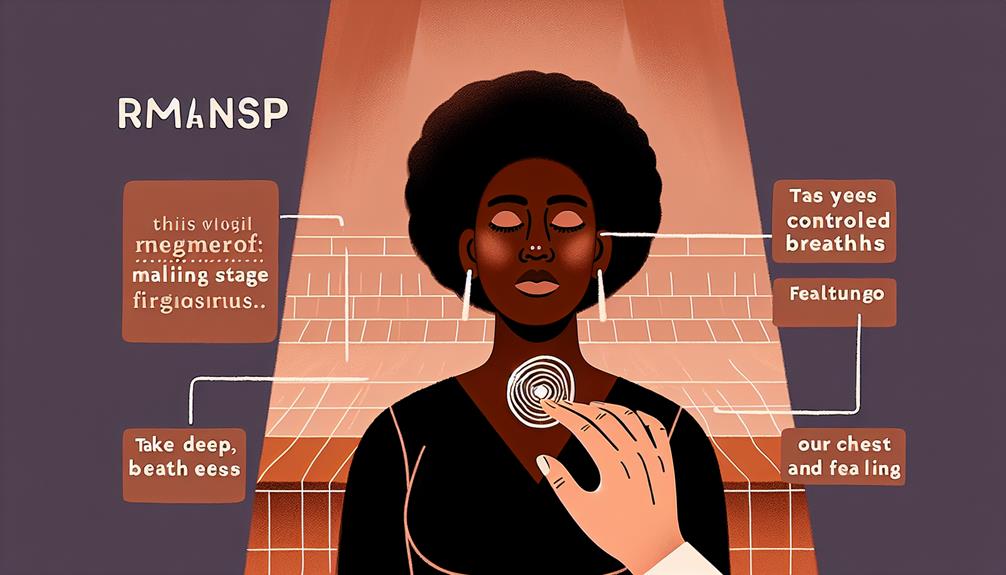Are you tired of feeling anxious and overwhelmed every time you step on stage? Well, fear not! There are three highly effective strategies that can help you conquer stage fright and deliver your best performance yet.
By shifting your focus from yourself to the audience, replacing scary thoughts with calming ones, and practicing relaxation techniques, you can gain control over your anxiety and confidently take the stage.
But wait, there's more! These strategies not only help manage stage fright, but also enhance your overall stage presence and leave a lasting impact on your audience.
So, are you ready to discover the secrets to mastering stage fright?
Breathing Techniques for Stage Fright

To manage stage fright and overcome the fear of public speaking, it is important to incorporate breathing techniques. Practicing diaphragmatic breathing can help counter shallow and rapid breathing, calming your nerves in the process. Stage fright, also known as performance anxiety, can have a significant impact on your mental health and overall well-being. Symptoms such as rapid heartbeat, sweating, and trembling are common when faced with the prospect of speaking in public. However, by utilizing relaxation exercises and deep breathing techniques, you can effectively manage stage fright and deliver a confident and engaging public speaking performance.
Modern lifestyles and the constant use of gadgets often contribute to shallow breathing habits. By incorporating breathing techniques, you can counteract this habit and promote a sense of calm and relaxation. Diaphragmatic breathing, also known as deep breathing from the belly, not only helps to slow your heart rate but also creates a resonant voice, projecting confidence and control.
One effective breathing exercise is to take five low, slow deep breaths. This exercise helps anchor you into your body and activates the parasympathetic nervous system, which is responsible for relaxation. As you inhale deeply, focus on filling your belly with air, allowing it to expand fully. Then, exhale slowly, releasing any tension or anxiety. Repeat this process five times, and you'll notice a significant difference in your state of mind and body.
Incorporating breathing techniques for stage fright is a powerful way to manage your anxiety and overcome the fear of public speaking. By practicing diaphragmatic breathing and utilizing relaxation exercises, you can enhance your mental well-being and deliver confident and engaging presentations.
Visualization Exercises for Managing Stage Fright
When it comes to managing stage fright, one effective strategy is to engage in visualization exercises. These exercises involve creating mental images of yourself confidently delivering your speech or performance in vivid detail. You can imagine the audience's positive reactions and visualize a successful and enjoyable speaking experience. Focus on your strengths and abilities, and picture yourself conquering the stage with confidence and ease. By visualizing the venue, the audience, and your own body language, you can instill a sense of preparedness and confidence.
During the visualization exercises, it's important to imagine yourself feeling calm, relaxed, and in control before, during, and after your performance. This helps reinforce positive emotions and helps you overcome stage fright. By mentally rehearsing your performance multiple times, you can create a positive mindset and reduce anxiety. Visualization exercises can be particularly beneficial for individuals who experience stage fright as part of an anxiety disorder.
To enhance the effectiveness of visualization exercises, combine them with deep breathing techniques. Take slow, deep breaths as you visualize yourself performing confidently. Deep breathing helps relax your body and mind, reducing the feelings of anxiety that often accompany stage fright. With practice, you can learn to manage and overcome performance anxiety through visualization exercises and deep breathing techniques.
Mindfulness Techniques to Overcome Stage Fright

Practicing mindfulness techniques can significantly help in overcoming stage fright. When facing the fear of public speaking or performing, it's common to experience stage fright, which can make you feel nervous and anxious. However, by incorporating mindfulness techniques into your routine, you can effectively manage these feelings and perform with confidence.
One mindfulness technique that can help is mindful breathing. By focusing on your breath and anchoring yourself in the present moment, you can calm your nerves and reduce anxiety before speaking or performing.
Another technique is body scan meditation, which involves scanning your body for any tension and consciously releasing it. This promotes a relaxed and confident posture, allowing you to feel more at ease on stage.
Mindful visualization is also beneficial for overcoming stage fright. By visualizing successful performances and imagining positive outcomes, you can build anticipation and boost your confidence.
Additionally, cultivating self-compassion through loving-kindness meditation can ease self-judgment and embrace imperfections. This can help alleviate the fear of making mistakes and allow you to focus on your message or performance.
Lastly, mindful listening techniques can shift your focus from internal fears to external engagement. By staying present and connected with the audience, you can feel more at ease and less nervous.
Mindfulness techniques provide valuable tools to manage stage fright and empower you to speak or perform with confidence and poise.
Conclusion
In conclusion, by shifting your focus to the purpose of contributing something valuable to the audience:
- replacing scary thoughts with calming ones,
- practicing relaxation techniques like deep breathing and meditation,
You can effectively manage stage fright.
Remember to keep positive thoughts in mind and engage in visualization exercises.
By implementing these strategies, you can overcome your fears and confidently deliver your best performance on stage.




